#Aziraphale has no faith in Heaven but he has faith in God. And I need season 3 right now immediately in my mouth
Text
📜METATRON’S MESSIAH RECIPE THEORY📜
You thought I’d stopped replaying the grueling ending of episode 6? Nope, quite the contrary. I’ve watched it so many times that I’ve come up with a new conspiracy theory about Metatron’s motives and Aziraphale’s choice at the end of season two. This is just my speculation, so read it for entertainment. The article is very long, so please bear with me.
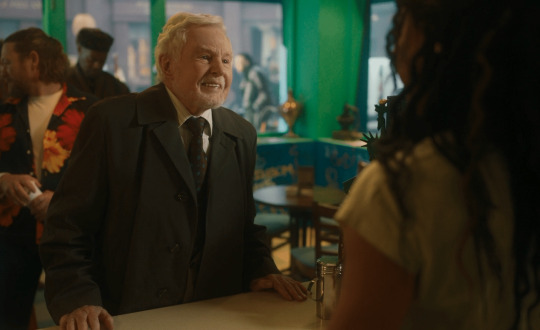
“Does anyone choose death?” – Metatron.
Surely, you’ve asked the same question as I have: “Why Aziraphale?” Why our angel, a “traitor” to his side, a low-ranking Principality, often seen as foolish, weak, and despised by his colleagues, was chosen by Metatron to become the Supreme Archangel, second only to God?
I’ve read many theories suggesting that the position of Supreme Archangel is merely titular, that Aziraphale will become a puppet in Metatron’s hands, allowing him full control. By separating the angel from Crowley, their combined strength would be diminished, ensuring the “Second Coming” goes smoothly without any hindrances. This theory made sense to me until I remembered the “Book of Life,” capable of erasing any entity with a single stroke.
And Metatron, the angel with full access to that book, could easily have erased Aziraphale and Crowley’s names, making them never exist. This indicates that Metatron’s plan goes beyond merely controlling the Ineffable Husbands' miracle; perhaps the scheme to separate them is deeper. Aziraphale and Crowley might actually be crucial to his plan, not just obstacles Metatron wishes to eliminate.
Anyone here read Frank Herbert’s Dune or watched its film adaptations? If so, you’d recognize two things:
1. Faith is the most powerful soft power, capable of wiping out armies. Nothing is more fearsome than an army of fanatics with unshakeable faith.
2. To have unity, you need religion and ideals. For religion and ideals to exist, you need an epic, a legend about “the chosen one.”
In season two, Heaven is depicted as highly fragmented, with Michael and Uriel vying for the Supreme Archangel position, Gabriel’s memory being wiped, and even Saraqael and Muriel aiding Crowley, a demon and their common enemy. Heaven is experiencing a severe personnel crisis, possibly even worse than Hell’s (at least Hell isn’t plagued by infighting).
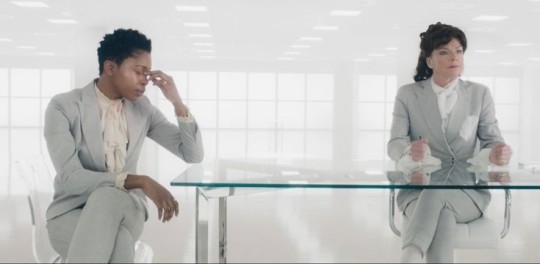
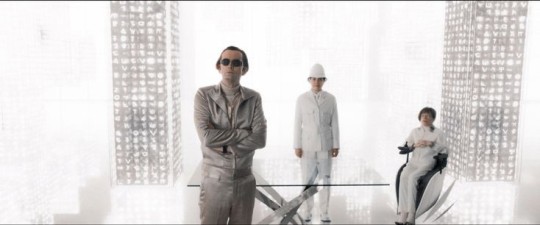
As the King of Angels, overseeing Heaven, what should Metatron do to address this urgent problem, especially with the “Second Coming” looming, and both Heaven and Hell preparing for a great war? A disunited heavenly army lacking faith and bickering over personal gains is not what Metatron desires. He needs to unify them before the Holy War to ensure victory.
Metatron realizes the angels need a new leader, someone to rekindle their dead faith in God, unite them under one ideal, and lead them to a vision of heaven’s ultimate triumph, performing miracles no other angel can.
That’s when Metatron decides to go to Earth to find Aziraphale.
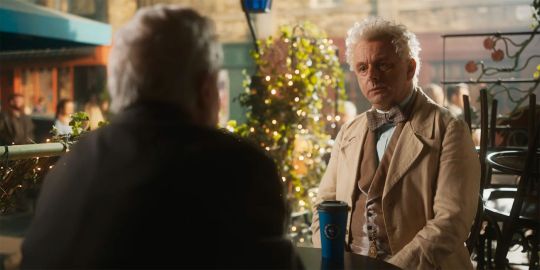
But why Aziraphale? We haven’t answered this question yet, have we? Why must Aziraphale become the Supreme Archangel, why is he “the chosen one”?
Simply because Metatron saw extraordinary qualities in him. The qualities of a heavenly “Messiah.” But what are the qualities of a Messiah? And what specifically has Aziraphale done to fulfill them? I’ll list some rather coincidental, perhaps eerily coincidental, details to support the idea that Aziraphale fits the messianic archetype, or even Jesus Christ.
To become a savior, one needs:
1. To perform extraordinary feats that no one else can: Jesus walked on water, prophesied, and healed. Aziraphale, in Heaven’s eyes, is the only angel who survived hellfire (like Paul Atreides surviving the Water of Life in Dune), prevented the Apocalypse, and persuaded the Antichrist, Adam. He understands human ways and Earth, something the other bureaucratic angels can’t grasp.
2. To have high ideals and absolute loyalty to the Almighty: This is evident in Jesus. For Aziraphale, it’s his unwavering faith in Heaven’s inherent goodness, his belief in God, and, crucially, his desire to reform Heaven’s corrupt bureaucracy that oppresses low-ranking angels while the higher-ups fight each other. (This echoes the plight of the Jews under harsh rulers and their prayers for a savior like Moses or Jesus. In Dune, the Fremen yearn for their Lisan Al Gaib to lead them to a Green Paradise. Angels are akin to the Jews or Fremen, longing for faith and salvation.)
3. To be compassionate, bearing the world’s sins: Jesus bore the hatred of the very people he sought to save but always forgave their sins. In Dune, Paul Atreides endured severe trials on Arrakis to earn the Fremen’s trust. Similarly, Aziraphale, despite Heaven’s mistreatment, holds no grudges and is ready to reform it for a brighter future for all.
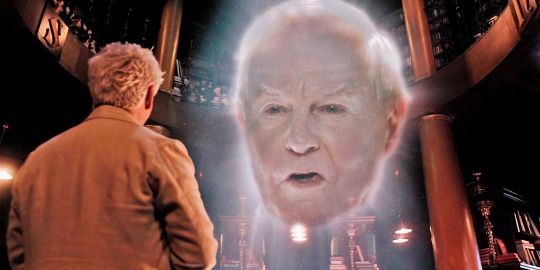
4. To be “betrayed” by someone trusted and willing to sacrifice everything to save the world: This is the interesting part. After Metatron targeted Aziraphale, who bravely asked God about the Great Plan (in season 1) and fought for his ideals, he likely planned to turn the angel into an epic saint, a true religious leader for his military ends. Remember Metatron’s question at the café:
“Does anyone choose death?”

The answer is yes. The Messiah chooses death to save everyone. Jesus chose crucifixion, knowing it would redeem the world. Paul Atreides drank the lethal Water of Life to become the Mahdi of the Fremen. And how do you push a saint into such despair, making them endure all pain to highlight their virtues, leading people to follow them and unite under their faith?
Every story needs a villain to highlight the hero’s virtues.
And both angels and demons hate traitors.
Jesus was betrayed by Judas, his close disciple, whom he trusted, someone with latent evil but whom he always forgave. Judas wanted a violent revolution, a physical liberation, contrary to Jesus’ “spiritual revolution.” Judas betrayed Jesus with a kiss.

And Aziraphale, excited about realizing his ideal of improving Heaven, was “betrayed” by the one he loved and trusted most, someone seen as a sinner but always recognized for his inner goodness. Crowley preferred “physical freedom” by fleeing to the stars, rejecting “freedom of thought,” which required resolving all potential threats. Crowley betrayed Aziraphale with a kiss.

After enduring all physical and mental agony, our Messiah will leave the mortal realm, forsaking all worldly pleasures to return to Heaven, where they save all beings.
So, from the perspective of other angels, the story of a “Messiah” Aziraphale with miraculous powers, grand ideals, a compassionate heart ready to forgive all sins, willing to bear hatred, pain, and the ultimate betrayal to lead everyone to a New Heaven, is skillfully crafted by Metatron. This legend will spread among the angels, inspiring them to follow their Supreme Archangel with renewed faith. They’ll believe in God again, more united than ever, ready to wield their flaming swords against Hell. Michael and Uriel will no longer oppose their new leader, and no angel will doubt this propaganda, as they lack the knowledge of manipulation, and they’ve been subservient for too long.

By then, Aziraphale has completed his function, whether he resists or tries to stop it. It’s too late, as the angels only need a legend, a prophecy to believe in. Aziraphale has become that legend through Metatron’s orchestration. Like Paul Atreides, he becomes an unwilling saint, a Messiah without a choice, manipulated by those behind the scenes like the Bene Gesserit or Metatron. They only need a story, someone to ignite faith for battle. Thus, Heaven has a battle-ready army with unprecedented resolve for the Great War between Heaven and Hell. Metatron has achieved his goal. Perhaps the protagonist of the “Second Coming” isn’t Jesus or any other son of the Almighty but rather the return of the once-militant Heaven, which banished the fallen angels to Hell. Heaven will return to Earth on Judgment Day with their Supreme Archangel, who understands humanity to commence the reckoning, wielding enough power to face his hereditary enemy, the First Sinner, the Serpent of Eden, new Prince of Hell, who betrayed him with a kiss…
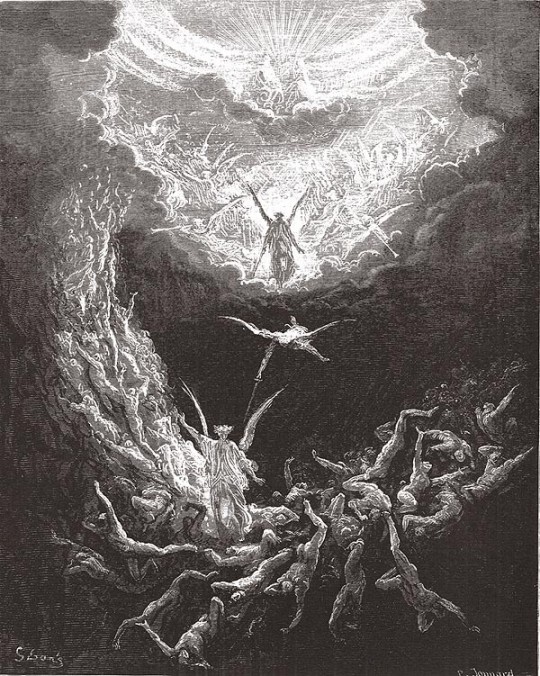
It will be a terrifying prospect.
Aziraphale only wanted to bring Heaven to Crowley. And now, he has brought “Heaven” to everyone.
Nothing lasts forever, nothing IS forever.
And that’s Metatron’s recipe for creating a Messiah, by Heaven’s most powerful weapon – Faith.
END.
#good omens 2#good omens#aziraphale#crowley#ineffable husbands#ineffable fandom#theory#Metatron's Messiah Recipe theory#english is not my first language#so i have to use AI to translate it#s2 ep6#metatron#heaven and hell#i'm dead#ineffable divorce#bamf aziraphale#am i insane#cursed posts#Deep dark fantasy
23 notes
·
View notes
Text
The thing is, I don't actually blame Aziraphale for thinking Crowley would want to become an angel again. At all. Crowley has been a miserable grumpy bitch on a consistent basis for thousands of years, and when was the last time Aziraphale saw him truly happy and unburdened? When he was an angel creating nebulas. I really think a big part of the problem here is, ironically, that he misses seeing Crowley openly and fearlessly happy, and he doesn't realize that the only thing that could really make Crowley happy like that again is... him.
#my posts#good omens#go#ineffable husbands#spoilers#typing on my phone is a nightmare but#I see a lot of people pissed with Aziraphale and I'm just not#I get it#I get both their perspectives#although I do think Aziraphale is hanging onto a fantasy - he's constructed that fantasy with the best of intentions#I don't think he wants Crowley to change who he is or anything. He wants what he's wanted for centuries--#for earth and crowley to be safe and happy#Idk maybe I'll feel differently after my second and third rewatches lol#but come on. No one knows Crowley as well as Aziraphale. And Crowley is fucked up about what God did to him#it still haunts him and Aziraphale knows that#It's just that Crowley has accepted and embraced the fact he'll never get answers and Aziraphale has not#Aziraphale has no faith in Heaven but he has faith in God. And I need season 3 right now immediately in my mouth#good omens 2
44 notes
·
View notes
Text
Aziraphale’s Choice, the Job Connection, and Michael Sheen’s Morality
Update: Michael Sheen liked this post on Twitter, so I'm fairly certain there is a lot of validity to it.
I’ve had time to process Aziraphale’s choice at the end of Season 2. And I think only blaming the religious trauma misses something important in Aziraphale’s character. I think what happened was also Aziraphale’s own conscious choice––as a growth from his trauma, in fact. Hear me out.
Since November 2022 I’ve been haunted by something Michael Sheen said at the MCM London Comic Con. At the Q&A, someone asked him about which fantasy creature he enjoyed playing most and Michael (bless him, truly) veered on a tangent about angels and goodness and how, specifically,
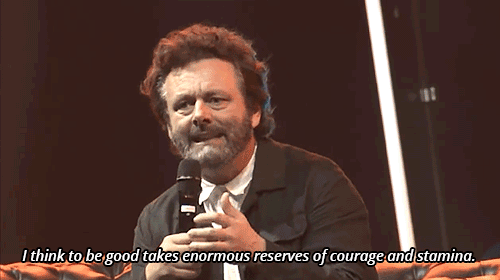
We as a society tend to sort of undervalue goodness. It’s sort of seen as sort of somehow weak and a bit nimby and “oh it’s nice.” And I think to be good takes enormous reserves of courage and stamina. I mean, you have to look the dark in the face to be truly good and to be truly of the light…. The idea that goodness is somehow lesser and less interesting and not as kind of muscular and as passionate and as fierce as evil somehow and darkness, I think is nonsense. The idea of being able to portray an angel, a being of love. I love seeing the things people have put online about angels being ferocious creatures, and I love that. I think that’s a really good representation of what goodness can be, what it should be, I suppose.
I was looking forward to BAMF!Aziraphale all season long, and I think that’s what we got in the end. Remember Neil said that the Job minisode was important for Aziraphale’s story. Remember how Aziraphale sat on that rock and reconciled to himself that he MUST go to Hell, because he lied and thwarted the will of God. He believed that––truly, honestly, with the faith of a child, but the bravery of a soldier.
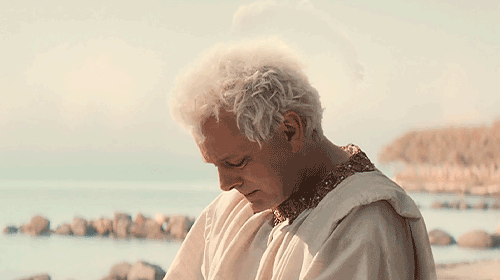
Aziraphale, a being of love with more goodness than all of Heaven combined, believed he needed to walk through the Gates of Hell because it was the Right Thing to do. (Like Job, he didn’t understand his sin but believed he needed to sacrifice his happiness to do the Right Thing.)
That’s why we saw Aziraphale as a soldier this season: the bookshop battle, the halo. But yes, the ending as well.
Because Aziraphale never wanted to go to Heaven, and he never wanted to go there without Crowley.
But it was Crowley who taught him that he could, even SHOULD, act when his moral heart told him something was wrong. While Crowley was willing to run away and let the world burn, it was Aziraphale (in that bandstand at the end of the world) who stood his ground and said No. We can make a difference. We can save everyone.

And Aziraphale knew he could not give up the ace up his sleeve (his position as an angel) to talk to God and make them see the truth in his heart.
I was messed up by Ineffable Bureaucracy (Boxfly) getting their happy ending when our Ineffable Husbands didn’t, but I see now that them running away served to prove something to Aziraphale. (And I am fully convinced that Gabriel and Beelzebub saw the example of the Ineffables at the Not-pocalypse and took inspiration from them for choosing to ditch their respective sides)
But my point is that Aziraphale saw them, and in some ways, they looked like him and Crowley. And he saw how Gabriel, the biggest bully in Heaven, was also like him in a way (a being capable of love) and also just a child when he wasn’t influenced by the poison of Heaven. Muriel, too, wasn’t a bad person. The Metatron also seemed to have grown more flexible with his morality (from Aziraphale's perspective). Like Earth, Heaven was shades of (light?) gray.
Aziraphale is too good an angel not to believe in hope. Or forgiveness (something he’s very good at it).
Aziraphale has been scarred by Heaven all his life. But with the cracks in Heaven’s armor (cracks he and Crowley helped create), Aziraphale is seeing something else. A chance to change them. They did terrible things to him, but he is better than them, and because of Crowley, he feels ready to face them.
(Will it work? Can Heaven change, institutionally? Probably not, but I can't blame Aziraphale for trying.)
At the cafe, the Metatron said something big was coming in the Great Plan. Aziraphale knows how trapped he had felt when he didn’t have God’s ear the first time something huge happened in the Big Plan. He can’t take a chance again to risk the world by not having a foot in the door of Heaven. That’s why we saw individual human deaths (or the threat of death) so much more this season: Elspeth, Wee Morag, Job’s children, the 1940s magician. Aziraphale almost killed a child when he couldn’t get through to God, and he’s not going through that again.
“We could make a difference.” We could save everyone.

Remember what Michael Sheen said about courage and doing good––and having to “look the dark in the face to be truly good.” That’s what happened when Aziraphale was willing to go to Hell for his actions. That’s what happened when he decided he had to go to Heaven, where he had been abused and belittled and made to feel small. He decided to willingly go into the Lion’s Den, to face his abusers and his anxiety, to make them better so that they would not try to destroy the world again.
Him, just one angel. He needed Crowley to be there with him, to help him be brave, to ask the questions that Heaven needed to hear, to tell them God was wrong. Crowley is the inspiration that drives Aziraphale’s change, Crowley is the engine that fuels Aziraphale’s courage.
But then Crowley tells him that going to Heaven is stupid. That they don’t need Heaven. And he’s right. Aziraphale knows he’s right.
Aziraphale doesn’t need Heaven; Heaven needs him. They just don’t know how much they need him, or how much humanity needs him there, too. (If everyone who ran for office was corrupt, how can the system change?)
Terry Pratchett (in the Discworld book, Small Gods) is scathing of God, organized religion, and the corrupt people religion empowers, but he is sympathetic to the individual who has real, pure faith and a good heart. In fact, the everyman protagonist of Small Gods is a better person than the god he serves, and in the end, he ends up changing the church to be better, more open-minded, and more humanist than god could ever do alone.
Aziraphale is willing to go to the darkest places to do the Right Thing, and Heaven is no exception. When Crowley says that Heaven is toxic, that’s exactly why Aziraphale knows he needs to go there. “You’re exactly is different from my exactly.”
____
In the aftermath of Trump's election in the US, Brexit happened in 2018. Michael Sheen felt compelled to figure out what was going on in his country after this shock. But he was living in Los Angeles with Sarah Silverman at the time, and she also wanted to become more politically active in the US.
Sheen: “I felt a responsibility to do something, but it [meant] coming back [to Britain] – which was difficult for us, because we were very important to each other. But we both acknowledge that each of us had to do what we needed to do.” In the end, they split up and Michael moved back to the UK.
Sometimes doing the Right Thing means sacrificing your own happiness. Sometimes it means going to Hell. Sometimes it means going to Heaven. Sometimes it means losing a relationship.
And that’s why what happened in the end was so difficult for Aziraphale. Because he loves Crowley desperately. He wants to be together. He wanted that kiss for thousands of years. He knows that taking command of Heaven means they would never again have to bow to the demands of a God they couldn’t understand, or run from a Hell who still came after them. They could change the rules of the game.
And he’s still going to do that. But it hurts him that he has to do that alone.
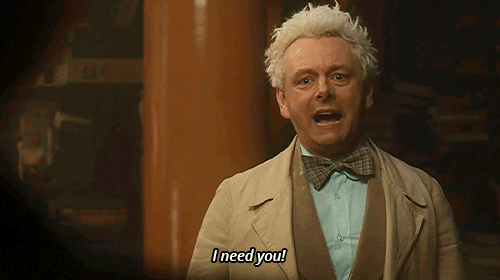
#good omens#good omens 2#ineffable husbands#it's kinda like capt america: civil war#with Azi as Tony Stark: traumatized and trying to do the right thing#and Crowley being Steve Rogers: fuck the establishment let's go rogue#gos2spoilers#good omens meta#good omens 2 meta#go s2#michael sheen#go s2 meta#go meta#*mine#*mymeta#ineffables husbands#ineffable soulmates#*mybest
11K notes
·
View notes
Text
Holy forking shirtballs
I'm choosing violence today. I started this on Twitter, but I'm going to finish my thoughts here like I always do.
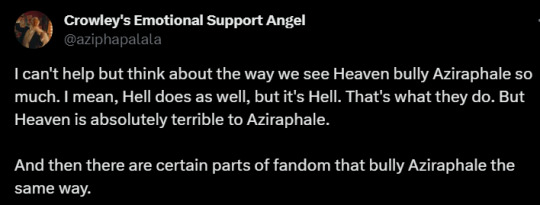
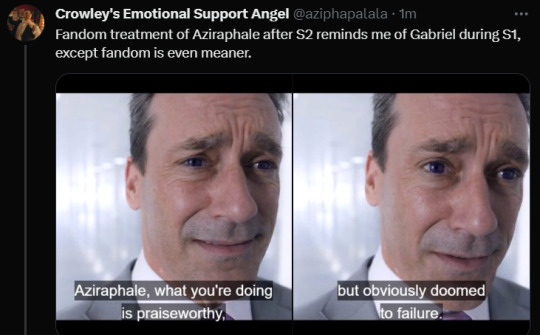
But what really blows my mind the most is the way that people look at Aziraphale's "choice" at the end, as if he had one to fucking begin with.
I'm sorry, but Aziraphale knows how messed up Heaven is. He told The Metatron, more than once, that he did not want to go back to Heaven! We can debate what each of us means by "choice" all night because my "choice" and your "choice" might be two different concepts. He could have been strong armed by The Metatron or he could have looked at where things were headed and realized he had no choice but to intervene himself.

You need to ask yourself what Aziraphale has a moral imperative to do.
What do we owe to each other?
Seriously, if you have not watched The Good Place, I recommend you go and watch it, because it absolutely shaped how I've viewed Good Omens 2 since its release.
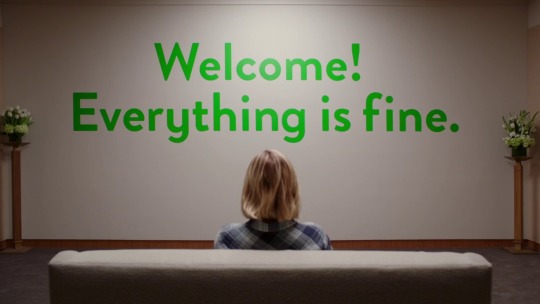
My levels of frustration with the bad faith mischaracterizations of Aziraphale are off the charts. If you are blaming him for everything, implying that he should have to grovel and that Crowley has a right to hurt him back, you have missed the point of Good Omens entirely.
I defend Aziraphale, but I don't think one of them is more right or wrong than the other. They're equals. They're a group of the two of them, acting and reacting to each other throughout history. They're Alpha Centauri.

I cannot even begin to explain how fucking devastated I felt when Crowley said these words, knowing he was fighting a losing battle. What he said took a lot of courage because he's finally admitting something they've both been too scared to publicly define for 6,000 years. Crowley has had to spend so long with a rough outer shell because he fell and had to hide all of his softness.
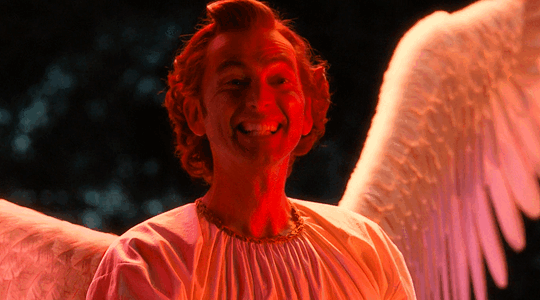
The look on his face was one of pure joy when he created that nebula, but I think the fact that he got to share that moment with Aziraphale is what has always stuck with him.
So yeah, seeing Crowley with a broken heart at the end of "Every Day" was sad for me as well.

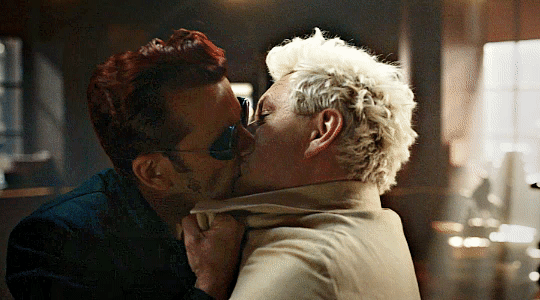
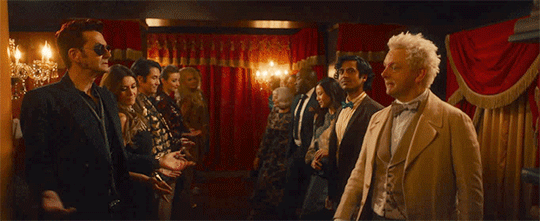
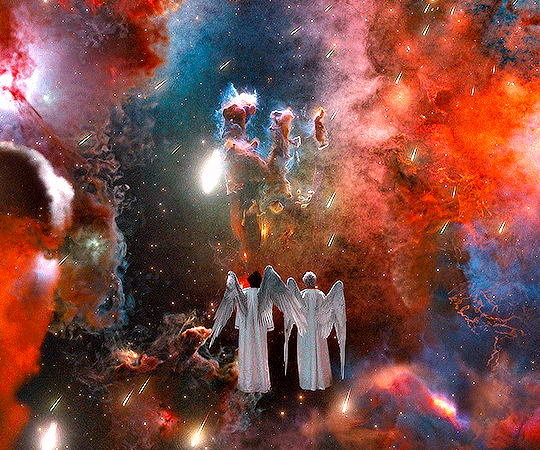
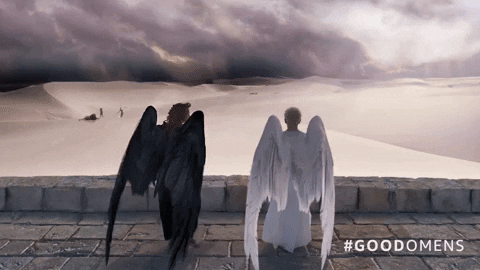



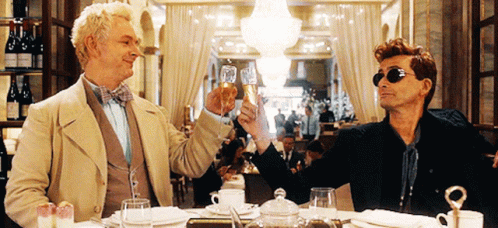
My brain still lives here!!
But Neil has said that Good Omens 3 is not quiet, gentle, or romantic. I imagine it's going to be more like the the first season in which they are not central to the plot. GO2 will help us make sense of how they ended up where they are when we see the bigger picture with all the other major players involved with GO3.
Aziraphale was still a soldier and accidentally got himself discorporated in his own magic circle in season one. He had a platoon waiting on him to start Armageddon, and he deserted them to go save the world with Crowley instead. Aziraphale is a deserter. I need everyone to remember that. He yeeted himself out of Heaven and sought out Crowley before even locating a body just to warn him about what was happening so they could try to save the world together.

I can't help but think of 1941 and that magician who had been arrested for being a deserter.
Aziraphale disobeyed orders. That took courage but it branded him as a traitor against Heaven. They tried to destroy him for it the same way Hell tried to destroy Crowley for his part in stopping the war.
Aziraphale and Job are the only characters we have seen interacting with God directly. Aziraphale has spoken to God before and he is determined to do so again.
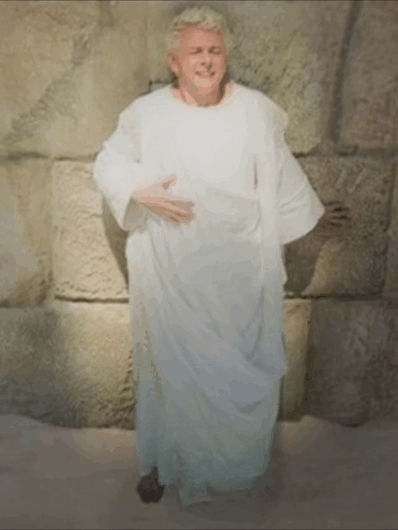
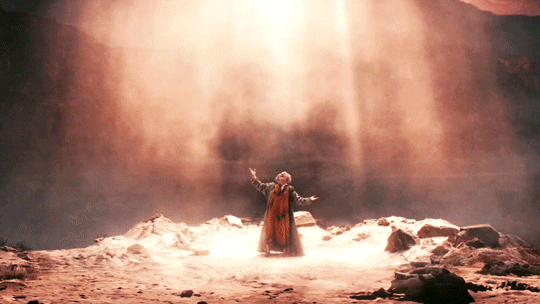
Aziraphale knows Heaven is flawed, but he also knows it's supposed to be good. He wants it to be good. He does not like the way the system works and he wants to make a difference. (And I'm pretty sure he's also determined to talk to God without being intercepted by The Metatron.)
Since when is that a bad thing? I don't get it. And I've had this discussion before.
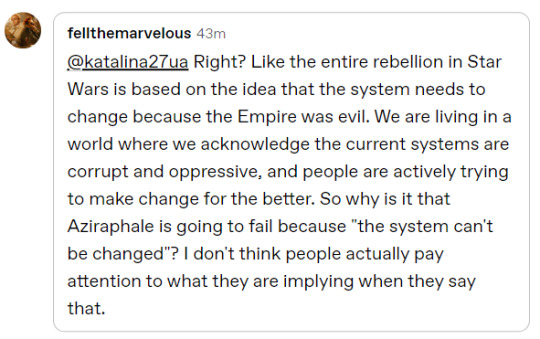
If you need to change the system by burning the old one to the ground, it's still change, and we don't know what Aziraphale has planned.
It seems to me that people just want to see Aziraphale fail because it would punish him for returning to Heaven instead of running off with Crowley.
Some of y'all take everything Aziraphale says or does and twist those things into malicious anti-Crowley actions because you think the only reason Aziraphale exists is to make Crowley happy, and if he isn't thinking only about Crowley then he's doing something wrong.
Aziraphale does not exist as a plot device to further Crowley's character. They come as a pair. They've been learning from each other for 6,000 years. Crowley challenges Aziraphale just as much as Aziraphale challenges him.
You can be mad at Aziraphale all you want, but villainizing him is gross. Defending Crowley does not mean you have to tear down and mischaracterize Aziraphale anymore than defending Aziraphale means you have to tear down Crowley (but I don't see that happen on nearly the same level it happens to Aziraphale). Stop painting Aziraphale as an abusive partner, for fuck sake.
Aziraphale knows there are flaws in the system. He wants to make a difference, and since he has seen that Gabriel can change, then maybe the whole system can. He has to at least try, and if he can succeed then maybe he and Crowley can stop hiding and finally be together without having to look over their shoulders all the time.
Why is that a bad thing? He's just as protective of Crowley as Crowley is of him!

But don't forget that Aziraphale's wing was covering Adam and Eve too. As much as a wants to protect Crowley, he has a moral imperative to keep humanity safe as well.
He sent Adam and Eve into the unknown with a flaming sword so they could protect themselves.
As much as he wants to be with Crowley, there are 8 billion people on Earth heading toward the Second Coming and Judgment Day. They'll work together to fight alongside humanity in the end. Aziraphale should not have to humiliate himself just to earn Crowley's forgiveness. That's a rancid notion.
The Resurrectionist was a whole ass moral dilemma for Aziraphale, which is why I brought up The Good Place earlier, but that's a post for a different time.
Aziraphale has his own motivations and they're just as important as Crowley's, and they don't have to be chalked up to Aziraphale being the bad guy. Weird, I know, but shades of grey.

"To the world."
#good omens#good omens 2#aziraphale#crowley#aziraphale defense squad#yeah i'm being bitchy#no i don't care if you're offended#no i'm not interested in your aziraphale hate#i'm not interested in hearing takes about aziraphale being toxic from people who can't even be objective#some of y'all need to watch the good place because you need a lesson in moral philosophy#we should be able to have discussions about the characters without gross takes calling aziraphale abusive#az and crowley approach everything from wildly different perspectives because of where they are#just admit y'all shit on az because he doesn't look or act like crowley#I'm so done with the shitty aziraphale takes#they aren't even interesting enough to debate#they're just annoying
483 notes
·
View notes
Text
"aziraphale has a master plan" do i need to remind you that his plan for season 1 was bad magic tricks, a board with some string, a centuries old prophecy book, and then—AFTER finding him—he just decided actually i will just talk to god and that will fix everything. oh crowley you are being hunted for sport by hell? too bad. goodbye. god will fix all of this.
finding the location of the antichrist by analysing a book is not a plan. he is smart, there is no denying that, but his faith in heaven has ALWAYS stopped him from actually making any plans because he thinks the right people will fix everything. that's the entire damn point.
#alex talks good omens#good omens#ineffable husbands#crowley#aziraphale#good omens season 2#go2#aziracrow#crowley x aziraphale#ineffable divorce#the final fifteen
398 notes
·
View notes
Text
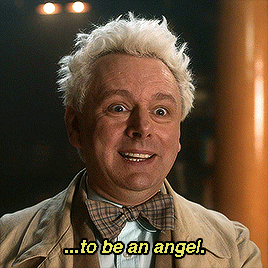
Okay so I know that we’re all upset at Aziraphale for this because of very obvious reasons. But can we take a minute to really look at where exactly he’s coming from? Because we only have Crowley’s perspective on the fall because we’ve only ever seen Crowley talk about it before. At least in his vague but colorful ways. Ex; Sauntering vaguely downwards, boiling pool of sulfur, etc.
But this season we get a little bit more on what Aziraphale thinks about Crowley becoming a demon.
And well. Aziraphale thinks that it was a mistake. More below the cut…
Full stop. Aziraphale thinks heaven was wrong about Crowley. He thinks God was wrong about Crowley. We see this in a few key scenes in both Seasons.
Let’s go Chronologically.
Job. Because I’ll never stop talking about the Job minisode. When Aziraphale’s caution is ignored in heaven, he goes to convince Crowley to stop and ignore the will of Heaven and Hell. (He doesn’t take into account that if Crowley doesn’t do the killing, another entity undoubtedly will.)
It’s the “I know you” and “I know [who] you were.” It’s the “I don’t think you want to do this.”
He had faith, even then, that Crowley would do what was right.
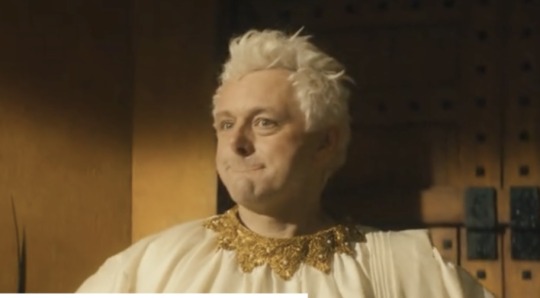
It’s the absolute and joyful giddiness of finding out that he’s right. That Crowley saved the goats, and probably the other creatures. That Crowley is going in that very beautiful house in order to save the children.
It’s the tragedy of Jemimah asking if Crowley is a demon and Aziraphale answering “Technically”. Crowley answers too, and he knows that there’s nothing technical about his state of being.
It’s the “you’re a little bit on our side”. And for all that Crowley denies, denies, and denies—Aziraphale doesn’t actually hear him. He hears “Yes. But I’m not an angel though, am I?” Aziraphale interprets, “I’m on my side” as “I’m not permitted to be on heaven’s side”.
In Rome, he extends Crowley an invitation to eat with him. He forgets himself. Tempting is Crowley’s job. He has to remind himself that Crowley is a demon, even if he’s a good person.
When they meet to watch one of Shakespeare’s gloomy ones, he looks to Crowley to do him a favor, and Crowley does. Without fuss. Just to see Aziraphale happy. Aziraphale smiles at this with familiar excitement. And a knowing look. (I want to shake him and screech, “Being good is not the same as being Good”)

Scotland. Crowley does a very good thing in this minisode, and he faces a very serious punishment for doing that good thing. Aziraphale can do nothing because Crowley is a demon who is good. And that is not a virtue in Hell, and the angel is confronted with the fact that Hell is not safe for Crowley. That hell will never be safe for Crowley, and we begin to see Aziraphale seriously worry about the arrangement and what it could mean for Crowley from this moment on.
And then we see a lot of Crowley saving Aziraphale from various scrapes and bad situations. We see Aziraphale refusing to give Crowley access to dangerous materials and then giving in so he doesn’t fall into more danger.
Aziraphale not only wants Crowley safe, he wants Crowley saved.
And at the end of season 1 and the majority of Season 2, Aziraphale embraces who he and Crowley are together. And he’s genuinely joyful about it, even with an undercurrent of sorrow he feels from being disconnected from heaven. We get hints of this throughout the second season… “You need to tell someone about something clever you did before you pop” “I can’t report to heaven anymore” “I’m afraid I’m out of miracles right now”.
This is the whole point; he never stops wanting to be good. And he never stops believing in Crowley’s goodness, either. Maybe even more than his own. (Aziraphale has to convince himself of his own righteousness almost as much as he has had to convince himself of Crowley’s evilness.)
And this brings us back to THE SCENE. Because right before Aziraphale makes his offer to Crowley. The Metatron has to make the offer to Aziraphale. And The Metatron plays Aziraphale like a fiddle.
The Metatron plays his cards exactly as he should right from the beginning, with ordering Aziraphale a coffee and making him drink it. It’s a subtextual threat, and Aziraphale probably doesn’t realize it, but Nina’s coffee shop is called “Give me coffee or give me death”. The coffee doubles as a gift from the Metatron to endear himself to Aziraphale and also as a signal to the audience that this guy is a very big deal, as well as a very big threat.
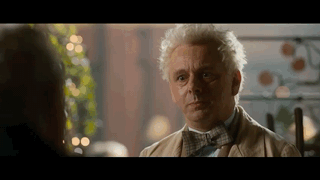
And then the Metatron separates our two entities from one another. Crowley has always given Aziraphale more courage when it comes to defiance, so Metatron invites Aziraphale away from the safety of his home(both the bookshop AND Crowley).
And then. And this is the Kicker.
The Metatron apologizes.
Not in the usual way humans do, but in the way that Crowley and Aziraphale do. By saying, I was wrong. You were right.
The Metatron praises Aziraphale. We were wrong about you.
The Metatron says that the only candidate for Supreme Archangel is him. You are heavenly.
The Metatron offers Aziraphale a way to bring Crowley with him. To bring Crowley back. We were wrong about Crowley.
Aziraphale looks at the Metatron in the face as the voice of God says Crowley’s fall was a mistake, and you can make it right. (The Metatron doesn’t actually say that in those words, but they ARE the words Aziraphale hears.)
So of course he’s excited to tell Crowley. Surely Crowley knows that his fall was a mistake too. Surely this is excellent news. The best news they’ve been given in a while. They were right after all. They can fix it. Together.
But then Crowley says no. And just as much as we think Aziraphale rejected Crowley—which of course, yes, he did—Crowley rejected Aziraphale too. And Aziraphale doesn’t understand why.
(And Holy Crap Aziraphale IS WRONG. Okay he’s wrong and it’s crazy, but I can follow the line right from before the beginning. Neil Gaiman and company, you are absolutely fantastic writers, I love how wrong they both are, and I love how wonderful they’re both trying to be, this was an incredible season.)
#good omens#good omens 2#good omens spoilers#gomens#go2 spoilers#good omens 2 spoilers#Aziraphale#crowley#crowley and aziraphale#ineffable husbands#ineffable divorce#aziracrow
929 notes
·
View notes
Text
I know that this has probably been said to death atp, but the most heartbreaking part of The Final Fifteen (™️) is that THEY WERE BOTH RIGHT.
All Crowley has ever wanted is to run away with his angel, whether it's to Alpha Centuries or just Aziraphale's bookshop. He was RIGHT to say that heaven and hell are toxic. He was RIGHT to say that they don't need them. He was RIGHT to say that he's better than that, that THEY'RE better than that. Crowley's a demon for a reason; he doesn't have faith in innate goodness, he knows that heaven and hell will break their promises. He's suffered SO FUCKING MUCH at the hands of both, and watched Aziraphale suffer for heaven's sake, and he's RIGHT to know that they deserve better.
But as much as he loves Crowley, Aziraphale could never give up on something without at least trying to fix it. There's no way that he could've just left, because that's not who he is and that's not the Angel Crowley loves. He believes SO DEEPLY in the good in the world, in the potential for change, so he could never pass up the opportunity to 'fix the system' - to make heaven a place where no one has to feel like he did again. Whether or not it works (and it will, in small, seemingly insignificant ways like the scriveners getting new offices, and the rules on who can go to earth loosening, and that little bit of rebounding kindness cycling around and around even the most toxic place), he had to try because THAT'S WHO HE IS. He's an angel in the best sense of the word, and he was RIGHT that he could make a difference. And, as much as we all hate to admit it, the metratron was RIGHT. Aziraphale will be a wonderful leader.
So I like to think that, once they get past the initial anger, despite the heartbreak they're both feeling, they understand each other.
And they're proud.
Aziraphale is proud of Crowley for acknowledging his worth and, in a smaller, guiltier way, for telling Hell exactly where to shove their job offer. He's proud of him for knowing that, even alone, he's better than that.
Crowley is proud of Aziraphale for still being the angel he fell in love with, and he's praying to someone other than God that Aziraphale is making the Metatron's life HELL (pun intended). He's proud of him for his kindness, and selflessness. He's proud of his determination to break the cycle.
#good omens#ineffable husbands#anthony j crowley#good omens 2#aziraphale#character analysis#i am unhinged about this show#the final fifteen#i fucking love them#They love each other so much#Even when they have to let each other go#And they're so proud of each other#God this show is painful#But yk#Its fine#We live#Because they're fucking INEFFABLE
352 notes
·
View notes
Text
why i love aziraphale and why i find his character so heartbreaking
So I made a post on why I relate to Crowley and I adore him, obviously. I think a few you misunderstood what I meant there, though (which is understandable, I was a bit incoherent but that is inevitable on this blog). I wasn't saying Aziraphale didn't care about Crowley or was horrible to him, rather the opposite.
What I was saying was maybe Crowley felt unloved against his better judgement, because he knows he is loved by Aziraphale, but maybe everything he has been through has started to chip away at that knowledge. It's happened to me, I'm sure it's happened to a few of you. You are assured that you are loved, you can see them doing things for you, but you feel unloved. Maybe because of the other people who don't love you. Maybe because... you don't love yourself.
But I definitely wasn't putting down Aziraphale, who is a beautiful character. I adore him. I love how every single second, all his emotions are on his face. That's actually how I realised they'd switched bodies--in heaven, 'Aziraphale' had a cool, dismissive look on his face. That could only be Crowley, I knew, because Crowley is a bit better (not a lot, not around Azi of course) at masking his emotions.
That's what's so beautiful about Azi, we can just see how much he feels, how much he adores Crowley, how much hope he had, how much faith in Heaven, how much determination to do the right thing. How determined he is to keep Crowley safe, to make Crowley smile and laugh, and how much it kills him every time he has to push Crowley away for both of their sakes, or he thinks he has to. You both want to protect that optimism and faith, and also shake him and tell him the truth. But how do we know better than him, a 6000 year old angel? There's so much that we don't know, that may have happened behind the scenes, that's orchestrating his decisions.
Some of you are certain that there is more, that he doesn't still believe that what Heaven offers is genuine, because how could he? I'm also sure that there is more, but can I also offer an alternate idea? Even if there wasn't more, maybe he isn't to blame if he did continue to believe in Heaven's goodness.
We've been in toxic relationships. With friends, partners, family. I know how hard it is to accept that something you love is not worthy of that love. Something you admired is something flawed. Something you would do anything to keep is something you need to push away.
The worst of all, of course, is that time, somewhere in our childhood or teens or adulthood, when a lot of us realise our parent or parents are not heroes. That we don't agree with them. That they were wrong about a lot of things. Because they taught us everything, they were our guides, how could they be wrong? And if we can't believe in them, then what are we supposed to believe in?
Maybe Aziraphale is going through that journey, over all those millennia. Some of us are forced to realise it before we even turn ten, some of us haven't realised it yet, some of us may not ever or may not need to.
Maybe Aziraphale is just a child of God, realising that Heaven, his technical family, is not the Good that not only they but the entire world believes them to be. Everyone says Heaven is good, including a lot of Hell, including a lot of humankind, it's just given. What is Heavenly is good. And Aziraphale wants to be good.
But he's going through that painful journey of realising that good may not be what he was taught, that good comes in many shades and tints and hues. And we can see him do it, we can see him defy Heaven and God, for Crowley or for humans or for himself. He's doing it, and we need to see how it isn't easy for him. Having your entire system of belief deconstructed is painful and awful. And if you were wrong once, how do you know you won't be the next time?
It's hard enough for Crowley, torn between whether he was unworthy or whether Heaven was wrong. Imagine the tumult that Aziraphale goes through, because if Heaven accepts him and Heaven isn't always good, does that mean Aziraphale has been doing it all wrong all his life?
He's going through something that we all go through, and is every bit as relatable as Crowley is. I love them both so much. I'm so glad that there's a third season, to see how that arc closes, to see if maybe they find the answers we're all looking for.
@adverbian and @howmanyholesinswisscheese, I hope this helps? Again, I haven't watched season 2 yet and have a horrible memory since I've been watching season 1 heavily medicated, so this is just from what I know and can tell and headcanon, perhaps.
#good omens#good omens fandom#aziraphale#good omens mascot#weirdly specific but ok#crowley#good omens s3#go 3#go 1#go 2#ineffable husbands#ineffable fandom#good ineffable omens#asmi#aziracrow#neil gaiman#aziraley#azirowley#love for Aziraphale#azi#good omens meta#angel#feelings#lgbtqia#maggots
238 notes
·
View notes
Text
good omens is an allegory for queer deconstruction from an abusive fundamentalist religious environment.
i've talked about it on here ad nauseum, probably, but i haven't fleshed my thoughts out on it fully. this has been my interpretation since season 1, and season 2 just solidified it for me. so here goes.
it's about the choice that all queer people in an environment like this have to make, and both choices suck and end with loss.
choice 1: stay with your church community, your friends, your family, the world you've always known, but never be true to yourself. because they will never fully accept you if you are true to yourself.
choice 2: embrace your queerness, live your authentic life, and leave it all behind. you're torn from everything you've ever known, everyone you've ever loved. but it's what you have to do to be happy. aziraphale is stuck between choices. crowley never had a choice. his was made for him.
heaven are the church elders. the protectors. the ones who say they have your and god's best interest in mind, always. they don't. to them, hell are the blasphemers, who are both unworthy of redemption yet can only be saved by it. they are the arbiters of what is good and right and bad and wrong.
aziraphale's story is one of both learned faith and earned faith. learned, in that he's been indoctrinated his whole life. been to church at least twice a week since birth. earned, in that he's seen the good that the church can do–they feed the hungry, shelter the unhoused. how could people who do such good be capable of cruelty? and surely, when they are cruel, there must be some greater good to come out of it?
crowley was faithful once, too. he loved god. loved church. but he knew he was queer from a young age, and asked questions about it. not because he wanted to make trouble, but because he wanted to understand. to understand why something he knew about himself to be so innately true could be wrong. but the church didn't see it as that–they saw the embodiment of sin, questioning them. their authority, their virtuosity, the fibre of what holds their organization together, and he was cast out. was kicked out of his home, alienated from his family, his friends, his community. he fell. and he now sees the church for what it truly is.
as for aziraphale, he's accepted the fact that he's queer, but had faith that his elders had his best interest at heart when they spewed homophobic ideology. he never believed the ideology, not really, but he had to believe (made himself believe) that the people who spread it meant well. that they meant it out of kindness, out of protecting queer people from damnation. he wanted to believe that not everyone in the church was like this, that not everyone in the church thought all queer people are inherently people of sin. that is, until a mentor, someone he trusts, perpetuates it too. he's had moments in his past that chipped away at his faith: he'd stayed friends, or whatever you want to call it, with crowley, and crowley had tempted him into trying new things that the church wouldn't approve of. things that aziraphale loved. but this moment with his mentor is when his faith is truly shaken. it's the beginning of his active deconstruction.
and so he leaves. he leaves and finds crowley and they build a semblance of a life together with what they have. they're happy. he's learning that he doesn't need to go to church to be holy. that he doesn't need to be holy to be happy. that he's allowed to indulge in the things he loves without guilt and shame.
that is, until that mentor shows up at his doorstep, offering him everything he's ever wanted. insinuates that he knows him and crowley aren't just friends, and assures him that they can come back to church together. that they're going to change things in the church, and that aziraphale can help. that they need aziraphale to help. (they don't. they want a pious gayboy to help repair their image. it's performative activism at its finest). aziraphale is being offered his family, his community, everything back, and crowley can come too. preying on his wants and desires, manipulating him back into their control. so of course he says yes. they'll get to be together with everything they've ever known and aziraphale doesn't have to make a choice between losses anymore. (deconstruction isn't linear, and abuse is cyclical.)
but crowley makes it for him. crowley tells him no. he doesn't want that life and doesn't want to go back to those people who hate him so much. who hate them so much. crowley knows what the church is about and sees it for what it is. they're not about god, or moral good or doing what's right. all they want is control. it's about the optics of the organization. it's about influencing what serves them and their agenda, and crowley knows that aziraphale is just a pawn to them. ("Why would we go back to them, when they think that who we are is wrong? Is vile? They think us the embodiment of sin and you want to go help them with their PR campaign?")
but aziraphale doesn't know that, can't know it, and crowley can't make him see it. (aziraphale knows that they cast crowley out, that he was kicked out of his home. crowley never shared with him about what happened after. the nights on the street, the things he'd endured to survive.)
and so crowley kisses him. he kisses him to tell him not that he loves him, because of course he does. he kisses him to tell him "This is what you leave behind. We would never be able to do this there, to be this there, even if they say we could. Our lives are here, our safety is here. this is what you're giving up."
crowley has been through it and experienced their cruelty firsthand. aziraphale won't be able to see it until he experiences it, too. he won't be able to realize he's being played if he doesn't even know that there's a game happening in the first place.
i can't recommend watching the show through this lens enough. it makes aziraphale's story that much more heartbreaking, because there's this intense duality of indoctrination vs. deconstruction that lives within him constantly. (imo it's also the main difference between book aziraphale and tv aziraphale: book aziraphale is significantly further along in his deconstruction journey. it's why he's a bit more of a bastard. tv aziraphale is set back a bit further, which sets up his deconstruction arc beautifully across three seasons.)
it's why aziraphale has the ability to peel back layers of himself and his train of thought depending on the situation at hand–he literally has two trains of thought happening at once. the indoctrinated one, and the deconstructed one.
and when crowley kisses him, it's the first time in his existence that both trains of thought have been that present simultaneously. it's both trains colliding full speed with each other. it's why we see both livid, hesitant frustration and fierce passion and longing at once. it forced him to confront something that lived so deeply within himself that he wanted to bring to light on his own terms, but crowley was desperate. the kiss wasn't i love you, please stay. it was look at what you're leaving behind. we could've been us, we could've been this.
and i think that whatever happens in season 3, whatever heaven does that makes them finally irredeemable in aziraphale's eyes, it'll be a beautiful ending to his deconstruction arc. not that deconstruction ever ends, not truly, but for the first time in his existence, he'll be able to see heaven, hell, and the system as a whole clearly for what they are: a bunch of self-righteous dicks.
[if you're curious about religious deconstruction and what it means, this video by therapist and social worker mickey atkins talking about deconstruction in reference to shiny happy people, a documentary about the duggar family, is a good place to start. cw for pretty much all types of abuse imaginable, fyi.]
#here is aforementioned meta post lmao#i feel like i can breathe lighter getting this out of my system#cw religious trauma#good omens#good omens meta#thoughts#neil gaiman
457 notes
·
View notes
Text
DO YALL REMEMBER THAT THING WHERE SOMEONE POINTED OUT "OH HEY IT KIND OF LOOKS LIKE CROWLEY'S WINGS GET DARKER AFTER HE STARTS TALKING WITH AZIRAPHALE ABOUT THE PLANS FOR THE UNIVERSE"
I THOUGHT IT WAS JUST LIKE WEIRD LIGHTING OR HOW THEY ANIMATED IT
NO
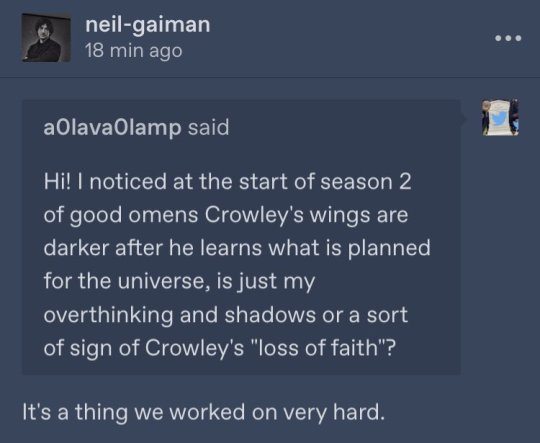
ITS LITERALLY FUCKING CANON
CROWLEY'S WINGS BEGIN DARKENING THE FUCKING MOMENT SHE BEGINS QUESTIONING GOD
Which, since this is in fact the case, that means that Aziraphale never really knew Crowley as an angel, because he'd been questioning God since almost the moment they met. There has never been a point where Aziraphale and Crowley knew each other where Crowley was as unquestioning and faithful as Aziraphale
I also saw someone point out that, again, since that is the case, Aziraphale is technically part of the reason Crowley Fell in the first place since he was the first one to tell Crowley "Oh yeah the thing you've worked on since you were literally created is only due to last like 6000 years"
Sure, Crowley would have found this out anyways, and knowing Crowley she absolutely would have went to talk to God about it and Fallen anyways
But Aziraphale is the one who kick-started that, and I imagine that if he knows that him telling Crowley literally led to his Fall, he's never forgiven himself for it
So in Aziraphale's head, Crowley taking his offer is how he fixes his worst mistake, his inadvertently getting Crowley thrown out of Heaven, but Crowley doesn't see it that way because he's always taken responsibility for his Fall. He can say all he wants that he didn't mean to, that he just "hung around the wrong people", but she 1000% blames herself for it, so Aziraphale's offer sounds, in Crowley's mind, like "You need to come back to Heaven with me because I don't think you're good enough as you are now", whereas for Aziraphale what he's trying to say is "You should come back to Heaven because you shouldn't have Fallen in the first place, this is my fault, and this is the best way to fix it"
#good omens#good omens spoilers#good omens season 2#good omens angst#aziraphale#aziraphale good omens#crowley#crowley good omens
346 notes
·
View notes
Text
Aziraphale and "I Forgive You"
So after I watched the first season a few times however many years ago, I noticed something, wrote up a bit of a meta about it and then never posted it. I thought that it was either very obvious or very silly and either way, no one needed to see it. But now it's several years and another season later and again, I'm noticing the exact same thing so here it goes- I think the reason Aziraphale keeps saying that he forgives Crowley has overall very little to do with what Crowley has just done right before Aziraphale says it and much more to do with a secret Aziraphale hides deep within himself and has for thousands of years, a truth that he hates to acknowledge and is terrified to speak aloud: he thinks God is wrong to have not Forgiven Crowley.
Get settled in because this is gonna take a bit.
The first time I started noticing this really clearly is the Bandstand Breakup scene. Crowley starts by cussing God literally out- "For the record, great, pustulant, mangled bollocks to the Great blasted Plan." To which Aziraphale says, "May you be forgiven." And yes, Crowley has just sinned and Aziraphale is a stuffy angel but the way Aziraphale says it is like a hope, atleast to my ears. Like he's really wishing that God will see how good Crowley truly is and bring him back to Heaven even though he keeps doing stupid stuff like this
Anyway, Crowley then responds with, "I won't be forgiven. Not ever. Part of a demon's job description. Unforgivable. That's what I am." And Aziraphale responds again with a hopeful sounding, "You were an angel once." At this point, I was almost sure that he's talking about his personal wishes here. It sounds like he's saying, "Come on, Crowley. There's a chance." To which Crowley responds, "That was a long time ago," basically saying it's impossible and shutting that whole bit of the conversation down. And you can just watch Aziraphale's face fall at that, like it kills him for that to be true.
The next time the topic of forgiveness and Crowley comes up is when Crowley shows up to beg Aziraphale to run away with him one last time. In this conversation, Aziraphale is very adamant that if he talks to the right people, they won't want the apocalypse and they'll stop it. He, of course, thinks this because his most core belief is that God is good and that even if we don't understand how what God is doing is good right now, it will lead to goodness eventually via the Rube Goldburg machine which is time and the universe etc aka God is ineffable. But even Aziraphale can't imagine how the ineffable Rube Goldburg machine could turn an event where everything on earth dies into a good one so therefore, he's certain that God doesn't want the Apocalypse.
Crowley responds to this hope with, "You're so clever. How can someone as clever as you be so stupid?" to which Aziraphale responds, "I forgive you" in a very gentle but sure tone. And now yes, while it is entirely possible that Aziraphale is forgiving Crowley for calling him stupid, I've always felt like that would be a rather weighty response considering how mild an insult it is. It's also possible (and I feel slightly more likely) that Aziraphale is forgiving Crowley for his lack of faith, his inability to believe in the goodness of God anymore.
And that could definitely be it, but if we think about the way Aziraphale had talked about forgiveness at the Bandstand, the hope and desire that he seemed to put into the idea of forgiveness and Crowley and the fact that Crowley had dismissed it as entirely impossible for him to ever be forgiven, than a third read of Aziraphale's "I forgive you" emerges: one in which Aziraphale is saying, "While God might never forgive you, I do". It's "I might never see you again since you intend to run away to the stars but if this is the last time I ever see you, I want you to know that I think you are deserving of forgiveness. That I see the good in you even if God can't." It's a combination "I love you" and small rebellion against God, because while Aziraphale can't bring himself to give up on Her completely and run away with Crowley (even though a part of him clearly wants to), he is willing to say that She's done this one thing wrong and it's never forgiving Crowley, who Aziraphale can see clearly is more kind and good than any of the angels he knows.
So yeah, that was about where the idea rested at the end of the first season but now we have a bunch of new historical scenes and a new "I forgive you" following a very loaded conversation in which Aziraphale got extremely excited by the idea of Crowley being reinstated as an Angel and I felt like this idea has even more legs than before.
To me, it's very clear that Aziraphale's pitch for Crowley to come back to Heaven isn't him hoping to "reset" Crowley to how he was before the Fall or him being incapable of loving Crowley as a Demon and instead was him being overjoyed to have this secret truth (Crowley is deserving of God's Forgiveness) that he's been observing for 6000ish years be acknowledged and have a chance to come to fruition. After all, as we saw this season (and honestly last season too but less pronounced), Crowley, current Demon Crowley, not the angel he knew over 6000 years ago, has proven over and over again just how truly good he is to Aziraphale.
For example, in the Job sequence, Crowley does a truly good thing that no Angel (beside Aziraphale) would do or even think that they should do and that is save Job's children. And through the entirety of this bit, Aziraphale basically always believes that he will. There are even two moments where Crowley tries his best to scare Aziraphale away, to play up being the bad guy (so as to better hide the con he's running and protect Aziraphale), but Aziraphale's faith in Crowley's goodness does not falter. At the end of the day, it seems clear that Aziraphale has more faith that Crowley will do the good thing, the correct thing than God. Conveniently for Aziraphale's faith in God though, not understanding how something horrible he hates will eventually lead to goodness in the long run is a foundational principle of said faith so his faith in God remains strong even after everything She and Heaven do to Job.
But his faith in Crowley doesn't require such a complicated work around. He believes Crowley won't kill children and he is correct. Though unfortunately, this very simplicity leads to a new problem, a problem that we can see eventually solidify in Aziraphale's mind, becoming a running theme of their association and leading to the eventual "I forgive you"s.
Aziraphale can clearly see how kind and good Crowley is, how he does the right thing as best he can, even when he could (and sometimes does) get into immense trouble for it. But for some reason, despite repeated evidence that Crowley is everything that Aziraphale believes Angels are and should be, Crowley continues to be a Demon. And once you realize that Aziraphale has noticed this contradiction and that it most likely haunts him and is a constant challenge to his worldview, it colors a lot of what he says in a new light. Many of what seem like simple, self-righteous statements reveal themselves to be Aziraphale trying to protecting himself from a massive logical inconsistency he keeps stumbling across.
"It must be bad, otherwise you wouldn't have tempted them into it," Aziraphale says, clearly not quite sure why it's bad actually.
"You, I'm afraid, are evil," Aziraphale asserts, basically stating that Crowley is evil because he's evil. It's tauntological and therefore doesn't have to make sense. (He says this one shortly before Crowley saves Elsbeth from suicide, poverty and damnation.)
"So this is all your demonic work? I should have known," Aziraphale says, thinking, "Aha, this time Crowley must have done the bad thing and therefore continues to deserve being Fallen." (Crowley has, in fact, not done the bad thing but shhhh, worry about that later.)
Once you notice this self defensive habit, you can't unnotice it really, it's just so present in Aziraphale's logic and speech. Aziraphale even at one point says, "Still a demon, then?" after the Ark and Job and Jesus because on some level he probably doesn't want to actually evaluate, it makes no sense to him that Crowley is still a Demon, especially when he has also sinned in a few ways (lied to Gabriel, thwarted the will of God, technically gluttony etc) and nothing has happened to him, to say nothing for all the things Gabriel has done (or has just let passively happen without a thought to interfere).
So yes, I think the entire final argument plays out the way it does because Aziraphale thinks Crowley is good and deserves to be reinstated, to be forgiven by God more than anything.
He comes into their final conversation nervous but excited, to the point where he stomps right over what Crowley is trying to say. "You see I... I have some incredible good news to give you." The good news is for Crowley, you see, because Crowley deserves this and clearly being forgiven like he so deserves should logically make Crowley happy. It will make Aziraphale happy after all.
Aziraphale then starts to describe the conversation that he had with Metatron, stating that he thinks he might have misjudged him. And why would he think that he misjudged the angel who had told him point blank to his face that "The point is not to avoid the war, it is to win it" about the Apocalypse? Well, it's not because he's offered the job of Supreme Archangel, that's for sure. As we can see in the flashback, Aziraphale seems nervous and uninterested in the job at first. He says clearly that he doesn't want to go back to Heaven and even brings up a very half assed excuse to try and weasel out of it, a soft no of, "Where will I get my coffee?"
No, instead, the clear, obvious point where Aziraphale changes his mind about the job and about the Metatron is when he offers to reinstate Crowley as an Angel. Metatron has, quite accidentally (I think? I don't think he actually knows Aziraphale's secret soul), just said one of the most faith affirming things he possibly could to Aziraphale, "We can correct that little error that's been bothering you. You are completely correct that Crowley deserves God's forgiveness."
Given that, it's understandable that Aziraphale is absolutely bubbly about Crowley's reinstatement when he mentions it to him, like the best thing ever has just happened to him even though he's talking about something that will happen to Crowley and not him at all. "You could come back to heaven and- and everything. Like the old times, only even nicer." (Nicer because this time, they are in love. Nicer because they'll both be powerful enough to make a difference.)
Some other bits of Aziraphale's dialogue from this scene that make so much sense through this lens are:
After Crowley tries to reiterate his constant stance that both sides are bad actually, and mentions how he rejected Hell's offer to work with them again, Aziraphale misses his point completely and says, "But well, obviously you said no to Hell, you're the bad guys. But Heaven, it's the side of truth, of light, of good." Aziraphale's faith in the potential goodness of Heaven and the actual goodness of God is unflappable but so is his belief that good is what Crowley wants to be doing. Like of course a good soul like Crowley would reject working for Hell again but why would he reject a chance to do good like he's sneakily been doing all along? (Aziraphale here ignores the fact that he's also had to sneakily do good on the side sometimes even though he was always working for "the side of good" but that is very par for the course for him sadly.)
The lines, "Come with me- to heaven. I'll run it, you can be my second in command. We can make a difference," are a particularly telling set. Everything about these from the high position he's offering Crowley to the "We" scream that Aziraphale trusts Crowley, a Demon, to guide Heaven the correct way more than any angel already in Heaven.
Aziraphale's final, desperate argument also lines up well with this (as well as featuring Aziraphale more completely referencing how he wants him and Crowley to be together romantically). "Come back, to heaven. Work with me! We can be together. Angels... Doing good. I- I need you! I don't think you understand what I'm offering you." Like is the "I need you" here romantic? Definitely. But it's also Aziraphale again affirming that he trusts Crowley to lead him the correct way ie goodness, because, as it's been shown to us many times (and focused on particularly in this season), Crowley will do and always has been doing the correct thing as best he could while Aziraphale would dither and be locked into passivity (like in The Resurrectionists).
So yes, after many attempts to explain to Crowley how he should be in Heaven, doing good and Aziraphale needs his help and one last desperate kiss from Crowley, we reach the final dreaded, "l forgive you." And yes, maybe Aziraphale is forgiving Crowley for not having faith that they can fix heaven, for abandoning him, for kissing him so suddenly. But I hope, after everything I've laid out here in this essay, you can also see why I think Aziraphale is saying, "Even as you reject God's forgiveness and leave me behind, I still see that you are good and know you deserve it so I will forgive you anyway." And maybe, even though it's still blasphemous to disagree with God, it's less scary for Aziraphale to say "I forgive you" one more time than tell Crowley that he loves him for the first time. He is very good at forgiveness after all.
#good omens#good omens meta#ineffable husbands#aziraphale#aziracrow#ineffable partners#crowley#good omens crowley#good omens season two#good omens s2#GOS2 Spoilers#Fingers crossed that next season Aziraphale realizes that while yes#Crowley is quite good#he doesn't need to be forgiven because he is in fact the wronged party here but we shall see#My GO Thoughts and Feels#I sure do hope it's apparent how much I love Aziraphale from this and it doesn't come across super negatively#This is forever a no Aziraphale hate allowed zone#but yes I spent forever writing this#so I hope it's clear#I need to post more of these sorry I'm a coward lols
288 notes
·
View notes
Text
been seein a few popular posts about what could Happen in season 3 that i think are kind of missing the mark a bit when it comes to crowley and aziraphale’s characters and both of their approaches to their relationship? so heres my take
aziraphale is a fighter: all throughout the book and season 1, he’s done his best to fight for what he thinks is right. the fatal flaw in this position is that he only ever does it within the confines of his faith and position as an angel: protesting punishing job until God’s Orders are cited; excusing his eating habits to gabriel by saying it helps him ‘blend in’ on earth; even after an entire day of listing things he wouldn’t be able to enjoy on earth anymore, crowley was only able to convince aziraphale to help him raise the antichrist by framing it as ‘thwarting wiles’ (ie. doing his job). aziraphale has always had a lot of conflict with how his and heaven’s ideals align-- this is why aziraphale went to heaven, so he could make the rules he’s so hesitant to break work for him instead of against him.
crowley on the other hand, is a flier: at the slightest sign of trouble he can’t fix, he flees. no, he does not want to dismantle the systems of heaven and hell, he wants to run away forever and never think about them again! he’s canonically tried to do this at least four times! but the fatal flaw in this position is that it means he sees everything he’s built and collected in 6000 years as disposable, which is not unlike how heaven and hell also think about the earth. he’s built a fragile, peaceful existence for himself, but is willing to run away and dump it all the second its peace and fragility is threatened by something he can’t control.
understanding both of these attitudes makes the middle ground where they realize their mistakes and come together again painfully obvious (imo): its earth! literally the ground in the middle between heaven and hell. crowley and aziraphale both already know that the other is worth protecting-- aziraphale wants to go to heaven so being together won’t be against the rules, and crowley wants to run away so heaven and hell can’t destroy them for being together-- so the revelation that needs to be reached in season 3 is that their lives and their history and their home is worth protecting too. beelzebub and gabriel had ‘heaven/hell is wherever you are’, but that kind of attitude (even ‘to the world’/they are each others world) doesn’t work for crowley and aziraphale because they spent 6000 years building something that makes simply being together synonymous with being on earth.
after all, the Really Big One is going to be all of us vs. all of them-- heaven and hell against all of humanity. when crowley and aziraphale have this exchange in the book and season 1, i fully believe that both them assume that when they say “us”, it means heaven and hell-- even after everything that happened, they’re still aligning themselves against the earth and the history they have there. which is why, after all their wonderful and inevitable character development in season 3, they’re going to realize that “us” actually means humanity.
#good omens#good omens season 2#good omens spoilers#good omens meta#good omens analysis#gomens#ineffable husbands#aziracrow#aziraphale#anthony j crowley#by me#this was made about Two Posts i saw that annoy me to no end#the first has like. Thousands of notes#and FUNDAMENTALLY MISUNDERSTANDS CROWLEYS CHARACTER#HES A COWARD NOT AN ANARCHIST#he wants to run away at the bandstand#and then later in the book shop before az calls heaven#and then again when gabriel shows up#and AGAIN at the end of s2#not ONCE has his response to heaven been 'fight back and take it down'#and the SECOND post is about az needing to choose between saving earth and saving crowley#which is a fundamental misunderstanding that crowley and earth are on different sides#its NEVER going to be crowley vs earth#crowley IS earth#its always always always going to be crowley and earth vs HEAVEN#their love is the most powerful thing in the universe so it will be easy actually for the two of them to beat both heaven and hell#ok thats all my thoughts i think#so can we stop blaming aziraphale for him being the only one with a flawed way of thinking#thanks :)#ok actually thinking about it more: both of their stances are sooooo reactionary to what heaven or hell could do to them
193 notes
·
View notes
Text
I don’t believe the ‘Metatron put something in the coffee’ theory, largely because the final scene is such a dramatic and powerful end to the season and it would be a shame if it turns out all of that was unnecessary because Aziraphale was under a spell or something. It is more powerful if Aziraphale’s decision to leave was his choice. He has always wanted to put faith in Heaven and God, he wants needs to believe they are the ‘good guys’ otherwise it’s bad guys and worst guys controlling his beloved Earth.
The gesture of Metatron giving Aziraphale a coffee is not dissimilar to Beezlebub giving Gabriel a fly. “No one’s ever given me anything before.” Yes, Aziraphale has gotten a lot from Crowley over the millennia, but this is the Voice of God coming to personally scout Aziraphale for the job of Supreme Archangel. Plus he is not picking one over the other, he choses this for Crowley.
Aziraphale was cast out of heaven for his actions in averting the apocalypse, and now the spokesbeing for God offers him a promotion for the very same reason, alongside giving him a token of kindness via the coffee. It isn’t what Aziraphale drinks, sure, but it’s a sign to him that things can and will change, how could he turn that down?
Gabriel, Sandalphon, and Muriel show us that angels do not know how to act on Earth, they don’t know traditions or emotions and they certainly don’t drink. I think the fact Metatron learnt enough about humans to know what a coffee is is something of a feat for angelkind. And it is also a great contrast between the beings who would say they know Aziraphale best just because they’re all angels, and the lovesick demon who knows Everything about Aziraphale, down to how he would want his chair angled.
Yes, it would be nicer to say this isn’t Aziraphale, but alas, I really think it is. He is an angel, a truly good one at that, it is in his nature to leave the life he loves to do something he believes will help everyone: angels, humans, and (perhaps most importantly) Crowley, who he knows feels the same way he does about how poorly things have been run. Crowley, like most of us, just knows it’s not going to get any better through a shuffling of roles, but Aziraphale has to put faith in this because if he can’t bring about change in Heaven, then who will?
#good omens#good omens spoilers#good omens season 2#good omens 2#innefable husbands#go2 spoilers#I have never posted anything before but these gay people are eating up my brain#coffee theory
210 notes
·
View notes
Text
It might seem crazy what I'm about to say, but since I can't really read people's expression well (thanks for that, autism) I have a different approach. You see, I like acting myself, yes, in part because it's a type of controlled masking and learning how to human in a socially acceptable way, so I analyse (fictional) characters' emotions etc by imitating facial expressions and seeing what that triggers in me. Kind of like associations, but mindsets, intents and emotions.
That's what I keep doing with Aziraphale specifically since he is who people keep criticising (bc Crowley obviously is perfect and doesn't make mistakes /s) and evidently not understanding him at all but I don't want to get upset about this again.
This is how I knew he wasn't disgusted (????) by the kiss and I've got an idea about how he feels in the lift to heaven at the end of s02.
The best one-word answer i can boil it down to is: defiance. He's going against all odds, against expectations and perhaps even his own better judgement/instinct. Like, he knows what he wants to do is risky and potentially dangerous, but he has to do it for the world, himself and Crowley, perhaps even a little in spite of him. He can do this. Yes, he paints himself as a damsel in distress a lot. Yes, he like the comforts and pleasures of earth and humanity. But don't you go underestimating him.
Part of me thinks he thinks the Metatron thinks (there's so much thinking involved here wow we're thoughtful) he's an easy puppet. Naive, innocent, believes in the unwavering and undebatable goodness of heaven. A toy soldier he can command and make do what he needs done. And in a way Aziraphale is all that. But he also isn't stupid. He's witnessed heaven's stance on ineffable plans during Nopeageddon, had his heart broken and his faith in God's institution shaken. He knows The Second Coming can't mean good news for earth, especially since Crowley's voiced his suspicion "all of us against all of them".
Aziraphale is being brave, resuming his position as a fighter, a guardian, only the Eastern Gate has expanded to mean the whole world and Crowley, maybe even Hell because balance is necessary for shades of grey and their lives hold value, too, after all.
He's on a mission and by God (no pun intended) he plans to accomplish it. There's no South Downs without earth or, indeed, without Crowley.
99 notes
·
View notes
Text
I think Aziraphale ultimately chose his and Crowley's side. Because it only looks like he's leaving or/and they're breaking up, Crowley's phrase is also understandable, but Zira chose the path to protect their side
We all understand that Aziraphale does not need heaven, angels or promotion, even the opinion of God is questioned and does not guide him. (At least that much)
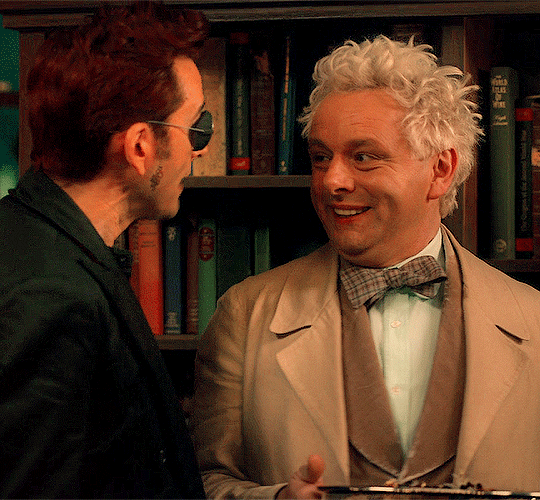
IMHO, he considers it necessary and right to protect his beloved demon from interference in their lives, not that we haven’t seen what Hell and Heaven are capable of. And the fact that Paradise has already done something bad to Crowley once probably still worries Angel...
Crowley himself opposes it only because he wants the same for “us.” He thinks that together they will be able to protect what they have been building in recent years TOGETHER
Maybe he is not sure that his angel is no longer subordinate to heaven so much?Or that Zira knows what to do /Will choose him over blind faith
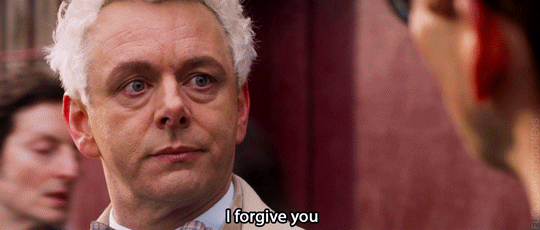
It's all very traumatic and lonely.But the only thing you need and can be sure of is
Love between them. Love is on their side. They have always been together and will always be Even when they separated, lost each other, quarreled, or were held back They returned to each other.
"To our side"
#good omens#they will be together because they are always together they're just soulmates real soulmates LoOovVvers-s#go s2#ineffable husbands#go s2 spoilers#crowley#aziracrow#ineffable partners#go s3#azicrow#aziraphel#crowley x aziraphale#aziraphale x crowley#aziraphale#good ineffable omens#ineffable spouses#ineffable lovers#ineffable idiots
52 notes
·
View notes
Text
The fruit of the tree of the knowledge of Good and Evil
When Gabriel first arrives to Whickber street, a truckful of tomatoes dumps its load at his feet, he even squishes one and almost trips.

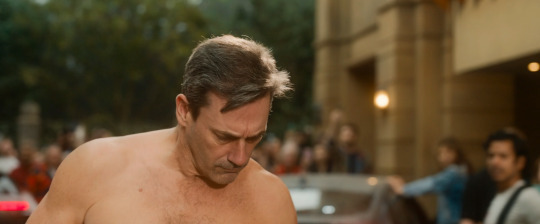
@scottishmushroom asked what this means in this post here, and I have some thoughts.
Every scene in this show is doing double duty, every image has symbolism attached to it. The symbolism needs to either be funny, or serve the narrative somehow (often both). And this season is lousy with Clues.
What twigged me to my thought was the further note that there seem to be baskets of tomatoes in the Job minisode. They seem to be a throwaway prop, except that they are placed exactly between Aziraphale and Crowley in the shot they appear in. The placement of objects matters, as it tells the audience what's important, whose POV we're seeing through, etc.

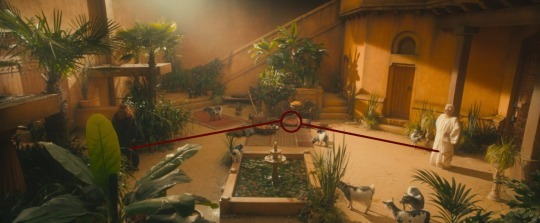
(Oh, hey! I just noticed that the plants in the shot with the pomegranates appear to be dracaena trifasciata -- common names include mother-in-law's tongue, SNAKE plant, and DEVIL'S TONGUE. Native to Nigeria, so not out of place here. I have a six-foot one of those in my sunroom! Hm!)
Back to the tomatoes.
Tomatoes in the Middle East during Bibical times? @docdust pointed out that those aren't tomatoes, they're pomegranates.
Aha.
Tomatoes used to be called "love apples" back in the day, and the Greeks referred to pomegranates as "grainy apples."
Apples, Bible, something something Eve ate something . . .
Eve ate of the fruit of the tree of knowledge, then offered the fruit to Adam who also ate it. Then both were cast out of Eden, because God was worried they would also eat of the tree of eternal life and elevate themselves to Her own status. (That part of the story gets left out a lot, I wonder why . . . )
There's actually no Biblical reference that we know of to any particular fruit. Some translator at some point labelled it an apple, and it's been thought of that way ever since. But apples weren't found in the Middle East during Biblical times, either, so it's unlikely it was actually an apple Eve ate. Pick a fruit to stand in, any fruit.
(In the TV series Lucifer, Eve jokes that it was always a metaphor, there never was a "fruit" of any kind. Unless maybe a banana? (She grins at Lucifer.) But I digress.)
So pick a fruit to stand in for apples. Maybe a tomato (love apple)? Or a pomegranate (grainy apple)?
In both scenes where these fruits appear, important characters are having a big crisis of faith. In both cases, their first crisis of faith. They are learning that Heaven isn't what it's cracked up to be. Gabriel has eaten of the fruit of the tree of knowledge, and has been cast out of Eden (Heaven). (Though we don't know that yet when he first shows up -- the tomatoes are A Clue!)
Aziraphale has eaten of the tree of knowledge and been cast out of Eden -- though in his case, Eden is simply naivete, his ability to go along with Heaven unquestioningly. ("What am I?")
Aziraphale's crisis of faith seems more clear -- even my bestie, while watching the show with me, got kind of upset at the Job minisode because of her own religious trauma. Job is touchy story for a lot of people. It's an appropriate place for Aziraphale to lose his confidence that Heaven is light and truth and good. It's a story that a lot of people lose faith over.
And Crowley, in this instance, is Eve. The one who's already tasted the fruit, and is offering it their partner. "Let me show you what you don't even know."
And so we have "apples" present at the moment of both characters gaining knowledge of good and evil. Or at least, gaining knowledge that Heaven isn't Good, and going against Heaven isn't Evil.
That's my take on it, anyway, and how I would interpret the symbolism of those two fruits present at that those two points in the narrative. Your mileage may vary.
#good omens#good omens 2#crowley#good omens meta#aziraphale#good omens analysis#good omens fan theory#good omens eden#good omens eve#good omens adam#good omens job#job minisode#good omens apples
40 notes
·
View notes